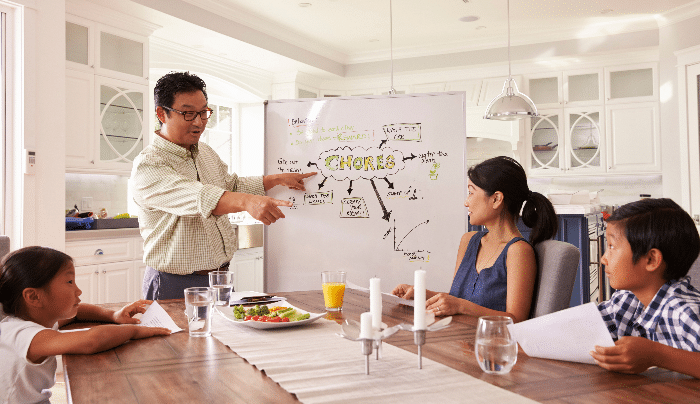The Role Of Communication In Successful Stepfamily Dynamics
Essential Communication Strategies For Building Trust And Harmony In Stepfamilies

Communication is important in any family unit, but practicing good communication skills is even more critical in stepfamilies. Why? Well, here’s a scary statistic: Up to 74% of blended families fail. There are many reasons for this, and there are just as many ways to ensure that your family isn’t one of them. One of the most important is overcoming communication barriers. Effective communication is essential for fostering understanding, trust, and harmony in stepfamily dynamics. This means actively listening to each other while expressing thoughts and feelings with no judgment. I also means being willing to compromise and find solutions that work for everyone involved.
Understanding the Unique Communication Challenges in Stepfamilies
Every family has their own ways of communicating. As a stepdad, you’re stepping into a situation that’s different from what you’re used to. You may have been taught to express yourself one way, and that might not be familiar or comfortable for your new blended family. It doesn’t mean that your way is wrong or their way is wrong– it just means that you have to work together to blend your communication styles, just like you’ve blended your families! When you sit down and talk as a family, take time to discuss the things that are different in the ways you communicate.
Another major challenge for stepfamily communication is the elephant in the room, the thing nobody ever wants to talk about unresolved issues from previous relationships. There are reasons that your spouse and their ex divorced, and these reasons are often very impactful on kids. Give your stepfamily space to talk about these unresolved issues. It’s not a reflection on you if the kids have strong feelings, positive or negative, about their biological dad. It’s just part of life in a blended family.
Building Trust Through Open Dialogue
One of the fastest ways to create family failure? Demanding trust and respect. These things are not given. They are earned, and that goes all ways. It’s not just important that the kids respect you– you have to respect them, too. The fastest way to build respect and trust is through honesty and transparency. This means you need to communicate your expectations clearly and understand that your way of doing things isn’t necessarily the way they’re used to.
You should also know that it’s ok to feel insecure and uncomfortable. You don’t have to put on a brave face all the time. Allowing yourself to be vulnerable around your blended family shows them that even adults aren’t always confident about things. This is super important during the initial stages of being a stepdad. Simply telling them something like, “Look, kids, I love you so much, but I’m really new to being a dad. I’m sorry I overreacted; I’m trying to figure things out. Now, let’s talk about what just happened and how we can work through it together” shows them that you’re figuring things out, too. Showing vulnerability helps show the kids that you’re human too, and helps turn you from a potential adversary into an ally.
Navigating Conflict with Constructive Communication
Of course, there will always be conflict at some point. That’s just how families work! If you want to resolve them, you need to work collaboratively.
Let’s explore this by looking at a common example of family conflict: a bad report card. When kids get bad grades, they usually don’t care as much about the grade itself as much as they fear disappointing their parents, or making their parents angry. If your stepchild brings home bad grades, don’t yell; instead, listen and express empathy. Yelling will not work to establish the behavioral changes you want. All it does is scare kids and show them that you aren’t a safe person when things go wrong.
Instead, try empathizing with your stepchild. Take a deep breath and realize that there’s a difference between disappointment and anger. Then try saying something like “Hey, I understand why you didn’t want to show me your report card- but I promise I won’t get angry or yell at you. I might be disappointed because I believe in you so much, but you never have to be scared of me. You can always come to me for help if you need it.” This shows your stepkids that you really are safe and can be trusted. Always be compassionate and constructive, and practice active listening to address the heart of a problem.
Setting Clear Expectations and Boundaries
We’ve talked about boundaries before, and we’re going to talk about them again, because they’re just that important. For stepfamilies, establishing clear boundaries helps you foster respect and maintain individual identities. They help everybody feel more secure while communicating. Boundaries help navigate complex family dynamics to build healthy relationships. They provide structure and guidelines to help everyone feel safe and respected. And remember: if you want people to respect your boundaries, you have to respect theirs!
Fostering Connection Through Shared Communication Rituals
Another important tool for blended families is the family meeting. Dr. Sheryl Zeigler, a psychologist with twenty years of experience working with blended families, points out that “a family meeting strengthens your family and your marriage. Kids see that both parents are interested and invested in how everyone is doing. Everyone has a voice.” Having meetings where everyone gets to speak makes it easier to value each family member’s perspectives and experiences.
And family meetings don’t have to be boring! They can become fun weekly or monthly traditions. Maybe on family meeting day, you all go out for ice cream or pizza or see a movie together that night. Pick something fun that works for your family.
Don’t Be Afraid To Seek Support!
Solving problems by yourself doesn’t work in a family. Sometimes, outside assistance is beneficial. Mental health professionals can do a great deal—and so can local support groups. Don’t be afraid to use online resources (like Support for Stepdads!) and community networks when you need them. Open communication is an effective, powerful tool for building strong, resilient relationships within stepfamilies. So is perseverance. Keep working together to prioritize communication and continue fostering understanding and harmony.





